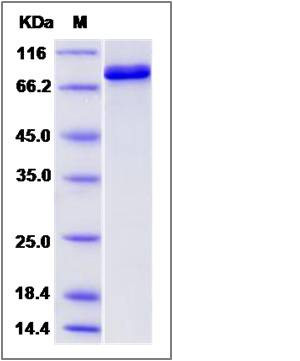Human IHPK1 Protein (His & GST Tag)
IHPK1,PiUS
- 100ug (NPP2266) Please inquiry
| Catalog Number | P13927-H20B |
|---|---|
| Organism Species | Human |
| Host | Baculovirus-Insect Cells |
| Synonyms | IHPK1,PiUS |
| Molecular Weight | The recombinant human IHPK1 /GST chimera consists of 678 amino acids and has a calculated molecular mass of 78 kDa. The recombinant protein migrates approximately 88 kDa band in SDS-PAGE under reducing conditions. |
| predicted N | Met |
| SDS-PAGE |  |
| Purity | > 95 % as determined by SDS-PAGE |
| Protein Construction | A DNA sequence encoding the human IHPK1 (Q92551-1) (Met1-Gln441) was fused with the N-terminal polyhistidine-tagged GST tag at the N-terminus. |
| Bio-activity | Kinase activity untested |
| Research Area | Immunology |Signal Transduction |Metabolism |Types of disease |Metabolism in Cancer |
| Formulation | Supplied as sterile 20mM Tris, 500mM NaCl, pH 8.0, 10% gly 1. Normally 5 % - 8 % trehalose, mannitol and 0.01% Tween80 are added as protectants before lyophilization. Specific concentrations are included in the hardcopy of COA. |
| Background | IHPK1 is a inositol hexaphosphate kinase (IHPK) protein which belongs to the inositol phosphokinase (IPK) family. IHPK proteins are likely responsible for the conversion of inositol hexakisphosphate (InsP6) to diphosphoinositol pentakisphosphate (InsP7/PP-InsP5). IHPK1 may also convert 1,3,4,5,6-pentakisphosphate (InsP5) to PP-InsP4 and affect the growth suppressive and apoptotic activities of interferon-beta in some ovarian cancers. During cell death, IHPK1 activity is enhanced, and intracellular InsP7 level is augmented. The distribution of IHPK1 or another predisposing gene affected by position effect of translocation may explain the T2DM phenotype at least in this family. |
| Reference |
